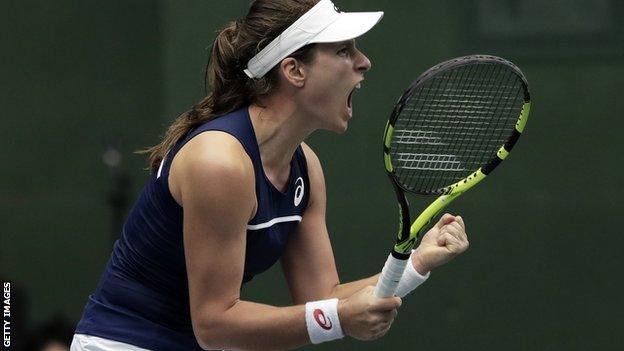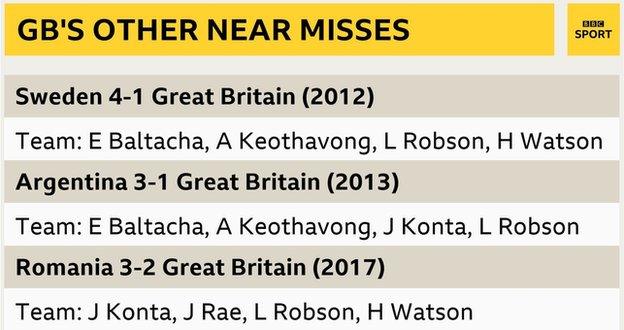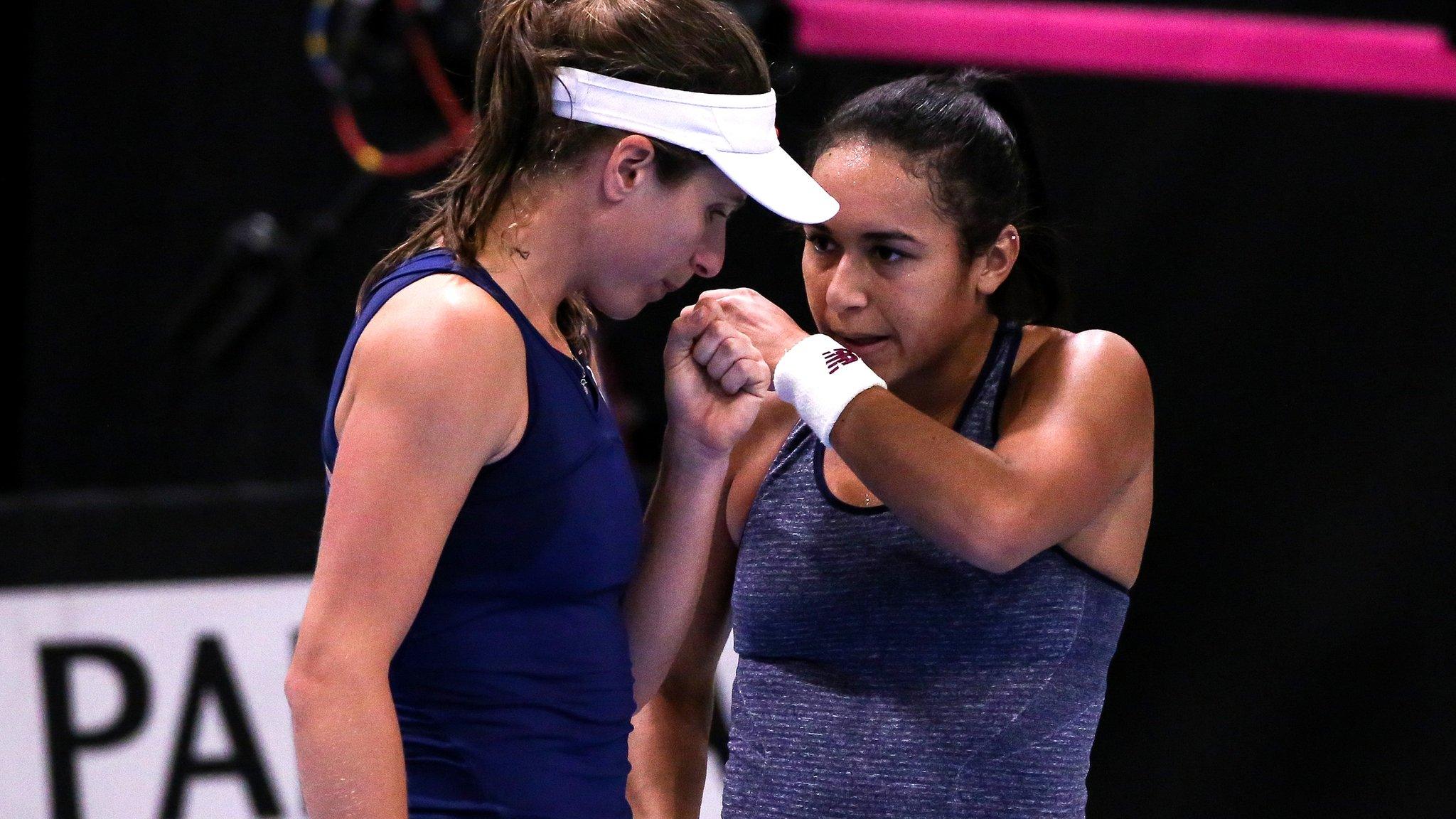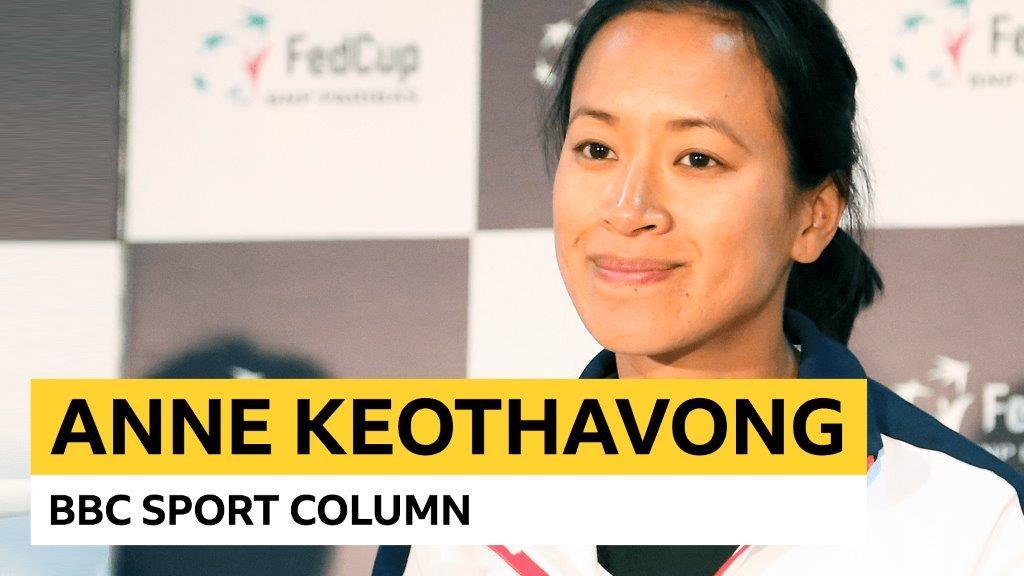Fed Cup: 'Great Britain's defeat by Japan a case of what might have been'
- Published
- comments
Highlights: Watson & Konta beaten in thrilling doubles decider
The disappointment felt by Britain's Fed Cup team seems all the more crushing when you consider what might have been, had the final set of the final rubber gone the other way.
Japan's win in the decisive doubles in Kobe took them into the World Group, which, if all goes to plan, will next year consist of 16 teams fighting it out for the title.
Britain's narrow defeat returns them to the Europe/Africa Zone, where they have been dwelling for the past 25 years.
The preliminary phase, staged recently in the Estonian capital Tallinn in the second week of February, can be hard to escape.
Only two teams from a minimum of 14 survive that stage of the competition, and next year Russia, who have six players in the world's top 50, will be among GB's opponents.
Britain have progressed to a World Group play-off four times in the past seven years. An away tie eight time zones away was always likely to be overshadowed by sporting events elsewhere, but when the zonal competition proves a bridge too far, that is it for the season.
To many in this country, the Fed Cup then ends in February, and with it the chance to showcase the women's game and a potentially exciting format.
This weekend in Kobe, with Heather Watson in a poor run of form and manifestly lacking confidence, Britain's lack of depth was exposed.
Gabi Taylor was the other singles player in the team. The British number four - Naomi Broady is ranked above her but does not play in the Fed Cup - has done magnificently well to break into the world's top 200 by winning three ITF events already in 2018, but at 20 and on debut, I do not think she was a realistic option to replace Watson in Sunday's singles.
Katie Boulter, 21, who was in the squad in Estonia, is just inside the top 200; another 21-year-old, Harriet Dart, is at a career-high 225; and Katie Swan, who has just turned 19 and reached the Australian Open junior final in 2015, is just outside the top 300.
One major test of Anne Keothavong's captaincy will be whether she judges the right time to bring these players into the starting line-up.
How the tie panned out... | |
|---|---|
Watson 2-6 3-6 Osaka | GB 0-1 Japan |
Konta 6-4 6-2 Nara | GB 1-1 Japan |
Konta 6-3 6-3 Osaka | GB 2-1 Japan |
Watson 6-7 (7-9) 4-6 Nara | GB 2-2 Japan |
Konta/Watson 6-3 3-6 3-6 Kato/Ninomiya | GB 2-3 Japan |
Britain's Davis Cup captain Leon Smith brought Cameron Norrie into his team to spectacular effect against Spain in February, when he was 22 and just outside the world's top 100. He came from two sets down to stun Roberto Bautista Agut - ranked 91 places above him - in Marbella.
Kyle Edmund was 20, and ranked exactly 100, when he made his Davis Cup debut in the 2015 final against David Goffin and went down in five sets after winning the first two.
It is difficult to make serious progress in the Davis Cup and Fed Cup when you rely on just two players.
Yes, Andy Murray and Jamie Murray were utterly dominant for Britain in 2015, but the year is likely to have recorded a first-round loss had James Ward not beaten American John Isner 15-13 in their deciding set in the very first round in Glasgow.

Johanna Konta saved eight of the nine break points she faced in her two singles matches in Japan
Anna Smith was the other non-playing member of the team in Japan this weekend.
The 29-year-old is an established WTA doubles player, but is yet to play a live Fed Cup rubber and has never played with Konta before.
So pairing up Johanna Konta and Watson for the decisive rubber appeared the best bet, although the unheralded Japanese pair of Miyu Kato and Makoto Ninomiya played beautifully - and reminded everyone of the benefits of having a regular doubles pair in the line-up.
It is another 10 months until Britain re-enter the competition.
Konta, who probably played her best match since last year's Wimbledon when she beat Naomi Osaka in the Sunday singles, is very likely to be present.

The defeat by Japan was the fourth time in seven years Britain have lost a play-off to reach the World Group - they were drawn away in all the ties
She ruffled a few feathers by pulling out of the 2016 zonal competition shortly after reaching the Australian Open semi-finals, but has not missed any other ties, and seems to enjoy the team environment more and more with every passing year.
The evolution of that team will be fascinating to watch.
Keothavong would love to see the likes of Taylor, Boulter and Dart hone in on the top 100 and increase the competition for places.
That may not happen quite as soon as some would like, but Britain do at least have a group of players who have the potential to keep each other company on the WTA Tour in years to come.
- Published22 April 2018

- Published20 April 2018
